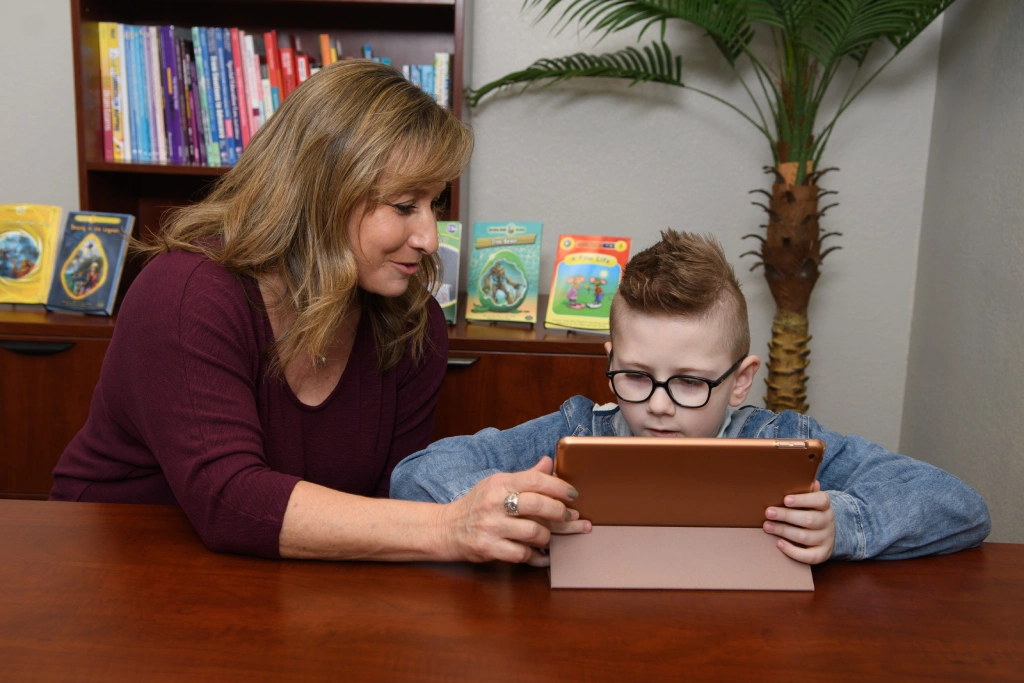Early detection of literacy challenges is crucial. The earlier you identify these issues, the more effectively you can address them, preventing them from becoming bigger obstacles in your child’s educational journey. Here are some signs that your child may be struggling with literacy:
Difficulty with Phonemic Awareness
Phonemic awareness is the ability to hear and manipulate sounds in words. This skill is foundational for reading, as it involves recognizing that words are made up of individual sounds or phonemes. If your child has trouble recognizing rhymes, identifying individual sounds, or blending sounds to make words, it may indicate a literacy struggle. This difficulty can lead to challenges in decoding and spelling, as phonemic awareness is a precursor to phonics skills. Engaging in activities that focus on sound manipulation, such as clapping out syllables or playing rhyming games, can help strengthen this skill.
Trouble with Decoding
Decoding involves translating written words into sounds, a critical step in reading fluently. Children who struggle with decoding might have difficulty sounding out words, frequently guess words, or avoid reading aloud due to embarrassment or frustration. This can impact their reading comprehension, as they may expend so much effort on decoding that they struggle to understand the text. Encouraging your child to break words into smaller parts or phonemes, and practicing with simple texts, can gradually build their decoding skills. Consistent practice, combined with patience and encouragement, can help them gain confidence in their reading abilities.
Limited Vocabulary
A limited vocabulary can be a sign of literacy struggles, as it affects both reading comprehension and expressive language skills. If your child uses a narrow range of words or struggles to understand what they read, it might be time to seek help. A robust vocabulary is crucial for understanding complex texts and expressing ideas clearly. Encourage your child to engage in conversations, read a variety of texts, and explore new topics to naturally expand their word knowledge. Introducing new words during discussions and explaining their meanings in context can also enhance their vocabulary.
Poor Spelling Skills
While occasional spelling errors are normal, consistent struggles with spelling can indicate literacy issues. Look for patterns in their mistakes, such as frequently misspelling common words or consistently confusing similar-sounding letters. Spelling difficulties can stem from weak phonemic awareness, poor memory for visual word patterns, or a lack of exposure to diverse vocabulary. Encourage your child to practice spelling through engaging activities such as word puzzles, writing short stories, or using spelling apps. This not only reinforces correct spelling but also makes learning enjoyable.
Difficulty Comprehending Text
Comprehension issues are a major sign of literacy struggles, as they hinder a child’s ability to engage with and enjoy reading. If your child can’t recall details, summarize stories, or answer questions about what they’ve read, they may need assistance. Reading comprehension is essential for academic success, as it affects understanding in all subjects. To support your child, discuss the text together, ask open-ended questions, and encourage them to make connections between the text and their own experiences. This interaction can deepen their understanding and make reading a more interactive and enjoyable activity.

How to Support Your Child
Supporting a child with literacy challenges requires patience and the right approach. Tailoring your support to your child’s unique needs and learning style can foster a positive attitude towards reading and literacy. Here are several strategies to help improve your child’s literacy skills:
Engage in Regular Reading Practice
Encourage your child to read daily, as regular practice can significantly improve their reading skills over time. Choose books that interest them and are appropriate for their reading level, ensuring that the material is neither too easy nor too challenging. Reading together can also be beneficial, as it allows you to model fluent reading and discuss the content, enhancing comprehension and engagement. Set aside dedicated reading time each day, creating a routine that emphasizes the importance and enjoyment of reading.
Focus on Phonics
Phonics instruction can help children understand the relationship between letters and sounds, a critical component of reading and spelling. Use phonics games, flashcards, or apps to make learning engaging and fun, turning a potentially daunting task into an enjoyable experience. Incorporating songs, chants, and interactive activities can also reinforce phonics skills in a memorable way. By making phonics an enjoyable part of their daily routine, you can help your child develop a strong foundation in reading.
Expand Vocabulary
To help expand your child’s vocabulary, introduce new words in context, making them relevant and meaningful. Use rich and varied language in everyday conversations, and encourage your child to ask questions about unfamiliar words. Reading a diverse range of books can also expose them to new vocabulary, offering opportunities to learn words in context. Playing word games and engaging in storytelling can further enhance their vocabulary, making language learning a fun and interactive process.
Practice Spelling
Incorporate spelling practice into daily routines to reinforce correct spelling and boost confidence. Use word lists, spelling games, and writing exercises to make spelling practice enjoyable and effective. Encouragement and positive feedback can boost your child’s confidence, making them more willing to take risks with new words. Creating a supportive environment where mistakes are viewed as learning opportunities can foster a positive attitude towards spelling.
Improve Comprehension Skills
To enhance comprehension, ask your child questions about what they read, encouraging them to think critically and engage with the text. Discuss characters, plot, and their thoughts on the story, promoting deeper understanding and enjoyment of reading. Encourage them to make predictions and connect the text to their own experiences, which can enhance engagement and comprehension. By actively involving your child in the reading process, you can help them develop strong comprehension skills that will serve them well in all areas of their education.
When to Seek Professional Help
Sometimes, despite your best efforts, your child may need additional support. It’s important to recognize when it’s time to seek professional help, as early intervention can prevent further challenges and enhance your child’s literacy skills. Here are some indicators that it might be time to consult a professional:
Consistent Struggles Despite Efforts
If your child continues to struggle with literacy even after implementing the strategies mentioned, consider seeking help from a literacy specialist. A professional can provide targeted instruction and support, addressing specific areas of difficulty. They can assess your child’s skills, identify underlying issues, and develop a personalized intervention plan. Early intervention can prevent literacy struggles from impacting other areas of your child’s education, setting them on a path to success.
Signs of Frustration or Avoidance
Children who consistently avoid reading or express frustration may benefit from professional intervention. Addressing these feelings early can prevent further setbacks, as negative emotions can hinder motivation and progress. A professional can work with your child to build confidence, address specific challenges, and make reading a more enjoyable experience. By tackling these issues head-on, you can help your child develop a positive attitude towards literacy.
Recommendations from Teachers
If your child’s teacher suggests additional support, it’s worth considering, as they have valuable insights into your child’s progress and potential areas for improvement. Teachers can provide recommendations based on classroom observations and assessments, helping you determine the best course of action. Collaborating with your child’s teacher can ensure a consistent approach to addressing literacy challenges, maximizing the effectiveness of interventions. Taking their recommendations seriously can lead to positive outcomes for your child’s literacy journey.
Finding the Right Support
Finding the right support for your child is crucial, as personalized assistance can make a significant difference in their literacy development. Here are some options to consider:
PDX Reading Specialist
A PDX reading specialist can assess your child’s literacy skills and create a personalized plan to address their specific needs. They offer evidence-based strategies and interventions to improve literacy, ensuring that your child receives targeted support. Working with a specialist can provide your child with the tools and confidence needed to overcome literacy challenges and succeed academically. Their expertise and personalized approach can make a significant impact on your child’s literacy journey.
Tutoring Services
Tutoring services can provide one-on-one instruction tailored to your child’s needs, offering personalized attention and support. Look for tutors with experience in literacy education and a proven track record of success, ensuring that your child receives high-quality instruction. A tutor can focus on specific areas of difficulty, providing targeted practice and feedback to enhance your child’s skills. By working with a tutor, your child can gain confidence and improve their literacy skills in a supportive environment.
School Resources
Many schools offer resources for children struggling with literacy, providing additional support within the educational setting. Speak with your child’s teacher or school counselor to explore available options, such as reading programs or intervention services. School resources can complement home support, creating a comprehensive approach to addressing literacy challenges. Collaborating with school professionals can ensure that your child receives consistent support and guidance on their literacy journey.

Encouragement and Support at Home
Your involvement in your child’s literacy journey is invaluable, providing encouragement and support that can boost their confidence and motivation. Here are some ways to offer encouragement and support:
Create a Positive Reading Environment
Make reading a positive and enjoyable experience by creating a cozy reading nook, providing a variety of books, and celebrating reading milestones with your child. Encourage them to explore different genres and topics, fostering a love for reading that can last a lifetime. Celebrate their achievements, no matter how small, to build confidence and motivation. A positive reading environment can inspire a lifelong love of learning and literacy.
Set Realistic Goals
Work with your child to set achievable reading goals, helping them track their progress and celebrate successes. Set goals that are challenging yet attainable, encouraging your child to push their boundaries while experiencing success. Celebrate their progress, no matter how small, to build confidence and motivation, reinforcing the idea that effort leads to improvement. By setting realistic goals, you can help your child develop a growth mindset and a positive attitude towards literacy.
Be Patient and Understanding
Remember that improvement takes time, and each child learns at their own pace. Be patient and understanding, offering support and encouragement throughout their literacy journey. Recognize that setbacks are a natural part of the learning process, and provide reassurance and guidance when needed. By maintaining a supportive and understanding attitude, you can help your child navigate challenges and build a strong foundation for future success.
Conclusion
Recognizing the signs of literacy struggles and taking proactive steps can make a significant difference in your child’s educational journey. By providing support at home and seeking professional help when necessary, you can help your child improve their literacy skills and build a strong foundation for future success. Remember, every child learns at their own pace, and with the right guidance, they can overcome literacy challenges and thrive. Your support, encouragement, and understanding can empower your child to reach their full potential and embrace the joys of reading and learning.
Contact PDX Reading Specialist for a Comprehensive Assessment
If you’re concerned about your child’s literacy development, don’t hesitate to reach out to a PDX reading specialist. A comprehensive assessment can provide valuable insights into your child’s strengths and areas for improvement. With personalized strategies tailored to their unique needs, your child can receive the targeted support necessary to thrive academically.
Take the first step towards enhancing your child’s literacy journey today! Contact a PDX reading specialist to schedule an assessment and unlock their full potential.


